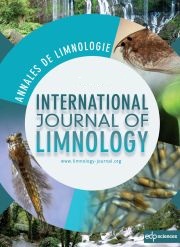Article contents
Structural variations of epiphytic diatom communities on threemacrophytes in a regulated river (Durance), in South-East of France
Published online by Cambridge University Press: 15 March 2009
Abstract
The epiphytic diatom communities living on two macroalgae, Chara vulgaris L. and Cladophora glomerata Kütz.) and oneangiosperm Potamogeton densus L., were collected in the Mediterranean river Durance. Each macrophyte species was studied on the basis of three plant replicates, each of which cut into three segments. Although considerable heterogeneity was observed in density of the epiphytic populations between the plant species studied as regards, the composition of these algal populations showed a conspicuous degree of homogeneity within each macrophytic species. These observations were corroborated by the coefficients of variation calculated on the main diatoms and by the non parametric Friedman tests.The qualitative homogeneity of epiphyton on Potamogeton densus foliage made it possible to map the spatial repartition of the main groups of diatoms growing on the upper side of leaves.These data support the hypothesis that the epiphytic algae occupy specific microhabitat niches on their host plants according to a non stochastic pattern of distribution.
Keywords
- Type
- Research Article
- Information
- Annales de Limnologie - International Journal of Limnology , Volume 38 , Issue 4 , December 2002 , pp. 297 - 305
- Copyright
- © Université Paul Sabatier, 2002
- 11
- Cited by


